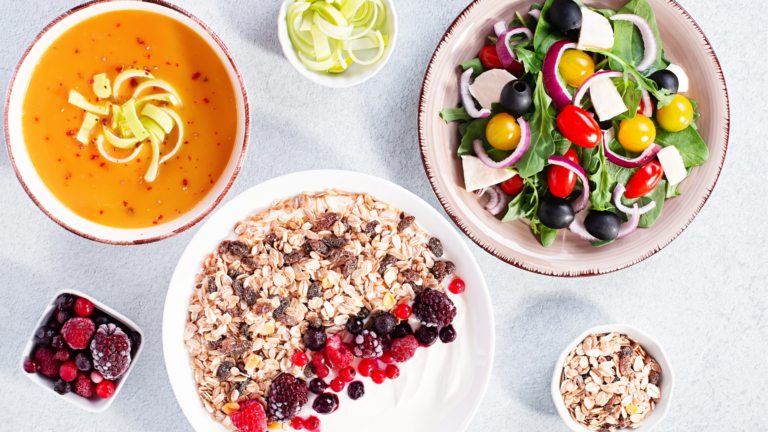Living with IBS often means carrying an invisible load, constant second-guessing, meal planning, bathroom-mapping and the quiet worry that today might be a flare day. When you’re already managing all of that, the thought of seeing a new specialist can feel overwhelming.
It’s completely normal to feel anxious before your first dietitian appointment. Many people we see tell us they worry about being judged, misunderstood or worry we will force them to give up their favourite foods. If you’ve had dismissive healthcare experiences before, those worries can feel even louder.
The good news? Understanding what to expect can make everything feel calmer, clearer and a whole lot less intimidating.
At Everyday Nutrition, we specialise in IBS, food intolerance and gut health. Our approach is designed to help you feel seen, supported and truly in control from the moment you connect with us.
Here is what your first appointment will look like, and how we help you feel confident throughout the entire process.
What does a dietitian do
Just like doctors specialise in different areas (diabetes, gynaecology, orthopaedics etc), dietitians specialise too. Some focus on diabetes, eating disorders, paediatrics or sports nutrition.
At Everyday Nutrition, our focus on gastrointestinal conditions like IBS, food sensitivities and gut health.

Our goal is to help you:
- Calm your gut
- Identify what foods work best for you and which foods may not
- Find the most liberal and enjoyable diet possible
We love food. We want you to enjoy eating, socialising and living your life with confidence. To do that, we need to understand you and create a personalised plan that fits your lifestyle.
How to prepare for your initial appointment:
Preparation doesn’t need to be perfect. Here’s what helps most:
✔ Think about your goals: What would you love to be different? What’s your biggest pain point? Clarity here helps us tailor your plan.
✔ Complete your intake form: When you book, you’ll get an online form covering symptoms, medical history and eating patterns. This also includes privacy consent information which gives us permission to see you.
✔ Share any results: Blood tests, imaging, scopes, specialist letters etc anything you have helps us see the bigger picture.
✔ Make a list of questions: You’re welcome to email them beforehand if that feels easier.
✔ Bring support if you want: It’s completely fine to bring a friend or family member. An extra set of ears can be comforting, especially if you’re feeling nervous.
Remember: you don’t need everything perfectly organised. Just bring what you can, and we’ll guide you through the rest.

What to expect from your first appt
Your initial appointment (online or in-clinic) runs for about one hour. We always start with a comprehensive assessment so we can build a personalised and realistic plan.
1. Getting to Know You
We want to hear about:
- Your work and home life
- Who you live with
- Your cooking and shopping habits
- How you like to spend your time
- What you want help with most
This helps us see what’s doable for you, not just what looks good on paper.
2. Your Symptom Story
We want to hear your whole story, including:
- What symptoms you get (yes, bowels included — it’s normal here!)
- When they started and how they’ve changed
- How they impact your day-to-day life
- What you’ve already tried
- Anything you’ve noticed that helps or worsens symptoms
Nothing is too embarrassing or “too much.” You get to talk openly in a no-judgment space.
3. Medical Background
We look at:
- Tests and results
- Medications and supplements
- Health conditions
- Family history
- Sleep, stress and energy levels
IBS and food sensitivity are influenced by many moving parts, and this gives us important clues.
4. Measurements (Or Lack Thereof)
We do not weigh you at our clinic. Weight tells us nothing about your IBS or what foods will work best for you. Instead, we take a weight neutral approach, meaning your health is not judged by your size or shape.
We only ask for measurements in two situations:
- Assessing growth for children
- Investigating unexplained weight loss
5. Your Food Patterns
We explore:
- Your appetite and meal rhythm
- What you typically eat in a week
- What foods or situations you suspect might worsen symptoms
We don’t need detailed food diaries unless there’s a specific reason. Just your usual eating patterns is enough at this stage.
Goal setting stage:
Next, we explore what matters most to you. For many people this includes:
- Reducing symptoms
- Identifying which foods sit well and which foods don’t
- Feeling more in control
- Making eating less stressful
Recommendations stage:
This is where all the pieces come together, and the patterns start to reveal themselves. By looking at your symptoms, history and current eating patterns, we build a clear picture of what’s likely driving your symptoms. We then map out the steps that will take you from Point A (where you are now) to Point B (how you want to feel).
We will present various options and explain the pros and cons of each, allowing you to choose the path that feels most realistic and doable for your life.
Your personalised plan might include:
- Medications, supplements of holistic therapies: Afterall, if we can fix things without limiting your diet, this is best case scenario.
- Simple Tweaks:Strategies to ease symptoms directly, such as optimizing meal timing, fluid intake or modifying certain foods, products, recipes or cooking methods.
- Elimination Pathways:At times we may suggest a targeted approach like Low FODMAP, gluten free, dairy free or the RPAH/low Histamine diet. We know elimination diets can sound daunting, but you will never be pushed into something you don’t want to do. If you choose this path, we guide you gently, at your pace, with all the support you need.
Our goal is simple: Your plan must feel supportive, flexible, and empowering.

Follow up
IBS and food sensitivity are rarely linear. Things happen, symptoms flare, life changes or the plan doesn’t work the way we expected. Follow-ups help us adjust, refine and move closer to clarity. We’ll explore:
- What worked
- What didn’t
- What surprised you
- New symptoms or stressors
- Any changes in routine
There’s zero judgment if you didn’t follow the plan perfectly (or at all). Our job is to help you find the easiest path forward, not grade your compliance.
If Plan A didn’t work, we simply create a Plan B or even a Plan C.
Ready to Take the Next Step?
If the invisible load of IBS has been weighing on you I hope this guide has helped lighten it. You don’t need everything figured out before you reach out, and you don’t have to navigate your gut on your own anymore.
You deserve clear answers, a calmer digestive system, and support from someone who understands the complexity of IBS and everything that comes with it.
If you’re ready to take the next step and get personalised guidance for your gut health, you can book an appointment with us here: 👉 Book an Appointment at Everyday Nutrition







